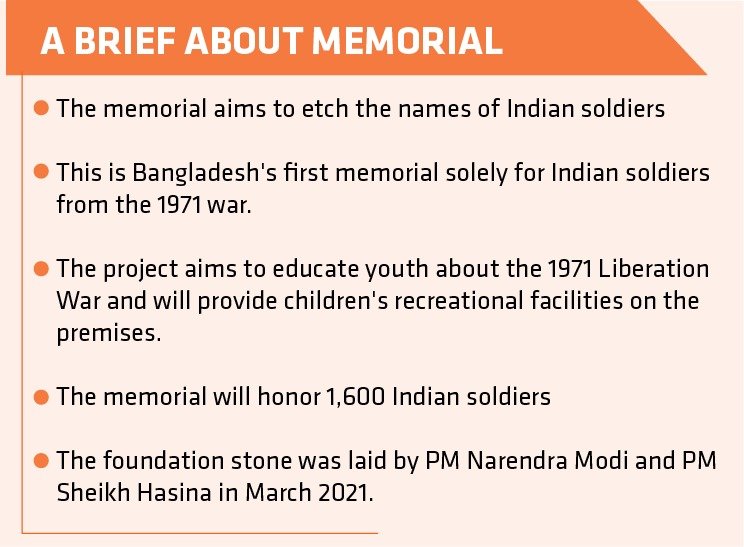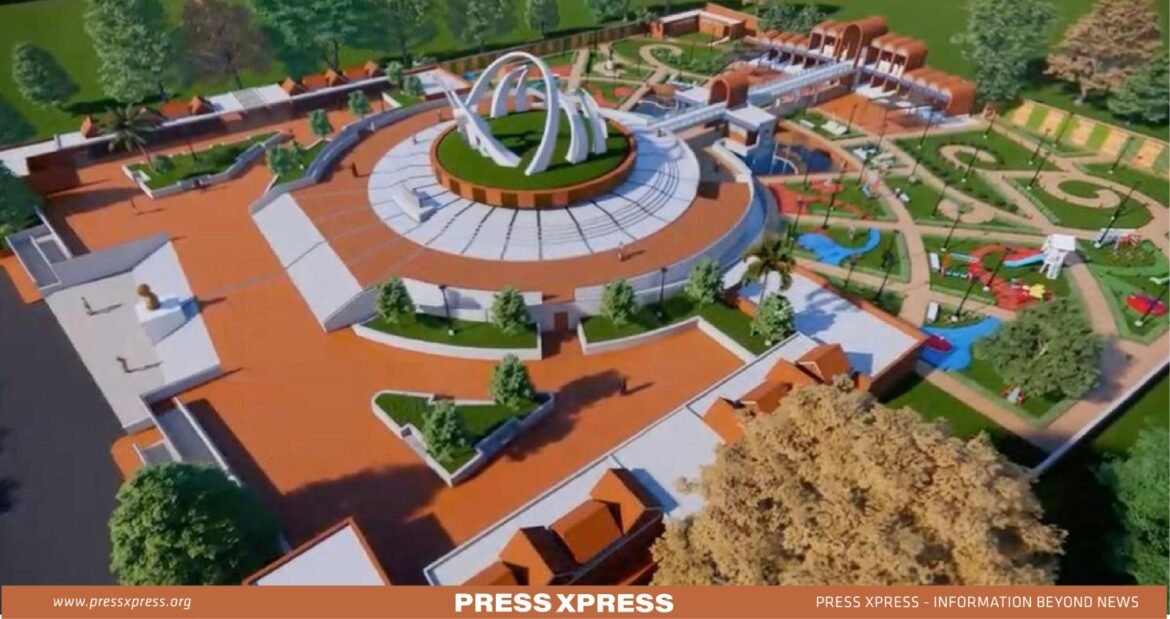The memorial’s purpose is to engrave the names of the Indian soldiers who aided heroically in Bangladesh’s liberation, underscoring their crucial role in the nation’s freedom
In a poignant tribute of remembrance and gratitude, a memorial dedicated to the Indian soldiers who made the ultimate sacrifice during the 1971 Liberation War of Bangladesh is nearing completion in Ashuganj, Bangladesh. This monument stands as a symbol of the profound solidarity and shared history between the two nations.
The commemorative, which is predicted to be completed by December, will carry a depiction of 1,600 Indian soldiers’ names.
This upcoming memorial will be the first in Bangladesh exclusively dedicated to honoring the Indian soldiers who sacrificed their lives alongside our Freedom Fighters to liberate the soil of Bangladesh from the Pakistani Military Occupiers.
A Dual Inauguration
In a significant historical event, the foundation stone for this poignant memorial was placed by Indian Prime Minister Narendra Modi and Bangladeshi Prime Minister Sheikh Hasina in March 2021, symbolizing the strong bonds between the two nations.
A.K.M. Mozammel Haque, the Bangladeshi Minister for Liberation War Affairs, expressed hope that the monument would be completed by December this year. He underscored that the inscription of the names of Indian soldiers on the memorial would stand as a clear testament to the sacrifice made by Indian soldiers and their enduring legacy.
Ongoing efforts are underway to have the memorial jointly inaugurated by both Prime Minister Sheikh Hasina and Narendra Modi. With the upcoming elections in both countries, the inauguration is targeted for March or April, providing an opportunity for both leaders to pay tribute to the heroes of the 1971 Liberation War.

Strategic Location and Historic Significance
The selected site for the memorial in Ashuganj holds significant strategic value due to its proximity to the Indian border, adjacent to the state of Tripura. This location was chosen to underscore the close and enduring ties between India and Bangladesh and to provide easy access for visitors.
Ashuganj played a pivotal role during the Liberation War, serving as the point where Indian forces crossed the Meghna River on their way to Dhaka. This historical significance adds a profound resonance to the memorial’s location.
During his visit to Bangladesh in March 2021, Prime Minister Modi paid tribute to the courage of the Indian soldiers who fought alongside their Bangladeshi counterparts. He also announced India’s intention to contribute military equipment used by the Indian armed forces during the Liberation War for display in Bangladesh museums, further strengthening the deep bond between the two nations.
India’s Role in Bangladesh’s War of Independence
The historical significance lies in the remarkable support provided by the Indian populace, government, and armed forces. When Bangladeshi mass people were murdered by the military of Pakistan, India interfered and sent the army to fight against Pakistani soldiers and supported freedom fighters.
On March 27, 1971, Prime Minister Indira Gandhi of India unequivocally extended her government’s support for the Bangladeshi quest for independence. The Bangladesh-India border was opened to provide safe refuge in India for Bangladeshi refugees. State governments in West Bengal, Bihar, Assam, Meghalaya, and Tripura set up refugee camps along the border. Exiled Bangladeshi army officers, as well as volunteer workers from India, promptly utilized these camps for the recruitment and training of Mukti Bahini guerrillas.
Almost 10 million men and women, compelled to flee their homeland for safety, sought refuge in various Indian states like West Bengal, Tripura, Assam, Meghalaya, Bihar, and Uttar Pradesh. These refugees, along with their children, were embraced by India, which willingly assumed responsibility for their well-being for a duration of nine months. India also supplied training, weaponry, and ammunition to support the freedom fighters.
Prime Minister Indira Gandhi, not only advocating for the liberation of Bangladesh but also the release of Bangabandhu Sheikh Mujibur Rahman from Pakistani imprisonment, undertook worldwide diplomatic efforts. India not only allocated significant financial resources to the Bangladesh liberation war but also made the ultimate sacrifice of many of its officers and soldiers. The Indian people, in a spontaneous display of compassion, initiated efforts to provide shelter and sustenance to the refugees from East Pakistan (Bangladesh).


